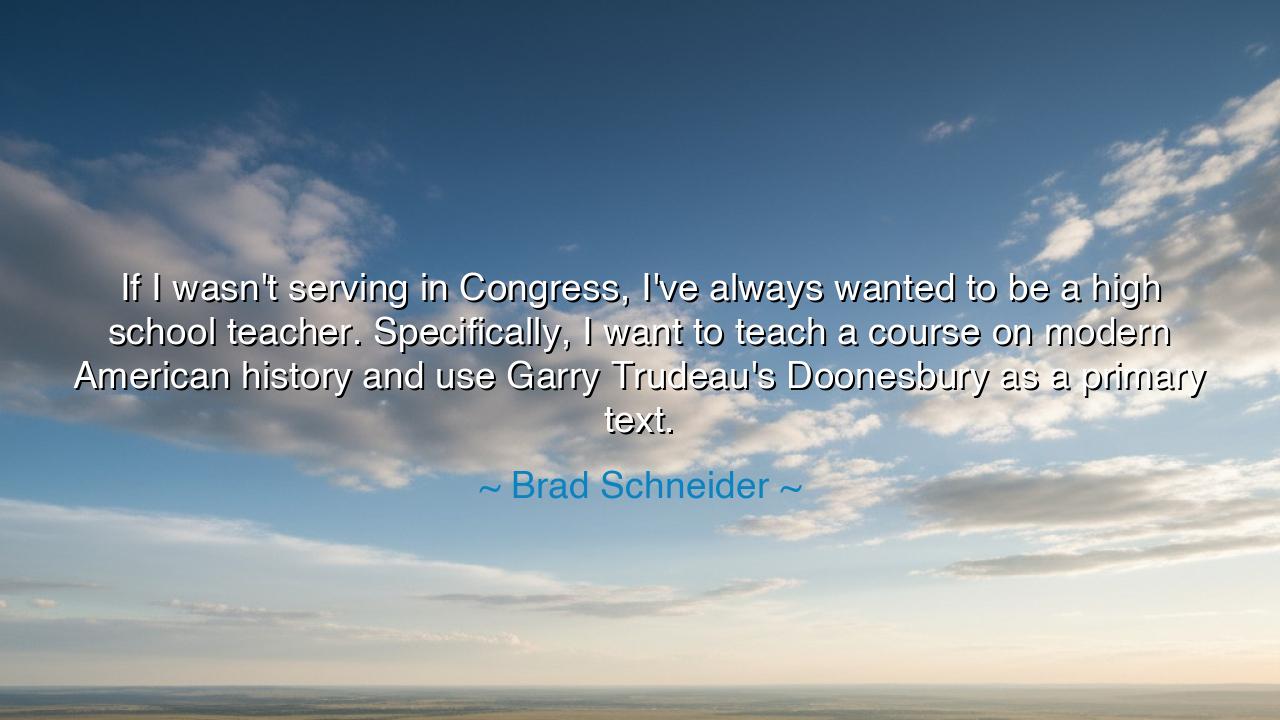
If I wasn't serving in Congress, I've always wanted to be a high
If I wasn't serving in Congress, I've always wanted to be a high school teacher. Specifically, I want to teach a course on modern American history and use Garry Trudeau's Doonesbury as a primary text.






Brad Schneider, a servant of the public, once revealed his heart with these words: “If I wasn't serving in Congress, I've always wanted to be a high school teacher. Specifically, I want to teach a course on modern American history and use Garry Trudeau's Doonesbury as a primary text.” Though spoken with humility, these words carry deep significance. They remind us that the work of a teacher is as noble as the work of a lawgiver, and that history is not only to be memorized in dates and facts, but to be lived, questioned, and understood through the stories and voices that reflect society’s struggles and triumphs.
The meaning of this reflection lies in the recognition that modern American history is not best taught as a dry collection of documents, but as a living narrative, full of humor, critique, and the reflections of its people. By choosing Doonesbury, a satirical comic strip that has chronicled politics and culture for decades, Schneider shows that he values perspective and voice as much as events themselves. Satire, in its way, is a mirror sharper than fact, showing us not only what happened but what it meant to those who lived through it.
The origin of such wisdom comes from the long tradition of storytellers who used satire to illuminate truth. In ancient Athens, Aristophanes wrote comedies that mocked politicians and exposed the folly of war. His plays were laughter woven with wisdom, entertainment braided with critique. In Rome, Juvenal wielded satire like a sword, cutting through the vanity and corruption of his age. Schneider, in invoking Trudeau’s work, continues this tradition — recognizing that satire is not merely jest, but a powerful teacher of history.
History itself offers examples where art illuminated truth as powerfully as any textbook. Consider how Charles Dickens shaped the conscience of Victorian England with novels that exposed child labor, poverty, and injustice. Or how the political cartoons of Thomas Nast helped turn public opinion against corruption in 19th-century America. These works, like Doonesbury, were not “neutral,” but they carried the pulse of their time. To study them is to learn history not as lifeless data, but as the beating heart of a nation’s struggles.
Schneider’s dream also reveals the intertwined nobility of teaching and governance. A congressman writes laws to shape the present and future. A teacher shapes minds to understand the past and prepare for what is to come. Both roles require faith in the generations that follow, and both are acts of service to a people larger than oneself. His words suggest that at the core of leadership, whether in the halls of Congress or the classroom, lies the same desire: to guide, to teach, and to pass on wisdom.
The lesson for future generations is clear: study your history not only in its official proclamations but in the voices that questioned and mocked it. For truth often hides in satire, in art, in the margins of culture. And honor your teachers, for they are as vital to the republic as your representatives, planting the seeds of thought and critical vision without which freedom cannot endure.
Practical action must follow. Seek out not only history’s grand speeches, but also its laughter, its criticisms, its art. Read the works that held leaders accountable, that gave ordinary people a voice, that revealed the absurdities of power. In your own life, be both student and teacher: learn from the past and share its lessons with others, whether in classrooms, conversations, or communities.
Thus, Schneider’s words become a timeless reflection: that whether one serves in Congress or in a classroom, the goal is the same — to nurture understanding, preserve democracy, and awaken the spirit of critical thought. And perhaps the greatest truth of all is this: that history is not dead, but living, and it is the teacher — sometimes with satire, sometimes with solemnity — who ensures that its lessons remain alive in the hearts of the young.






AAdministratorAdministrator
Welcome, honored guests. Please leave a comment, we will respond soon